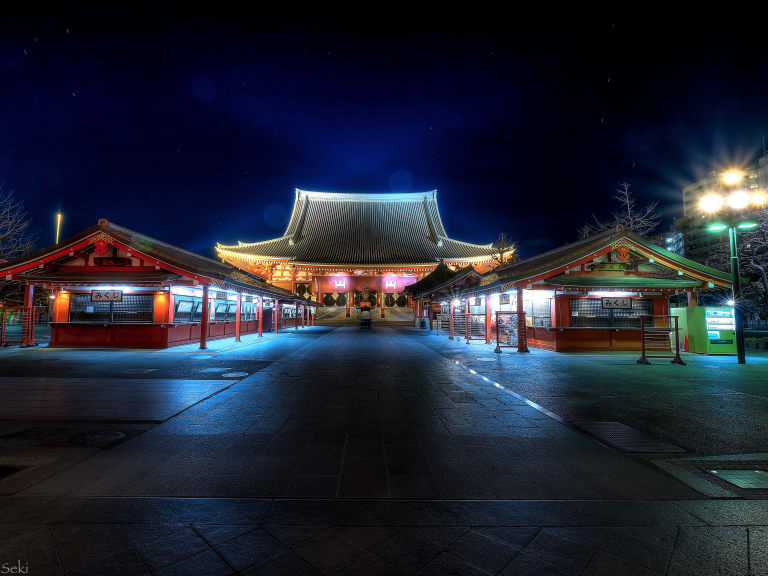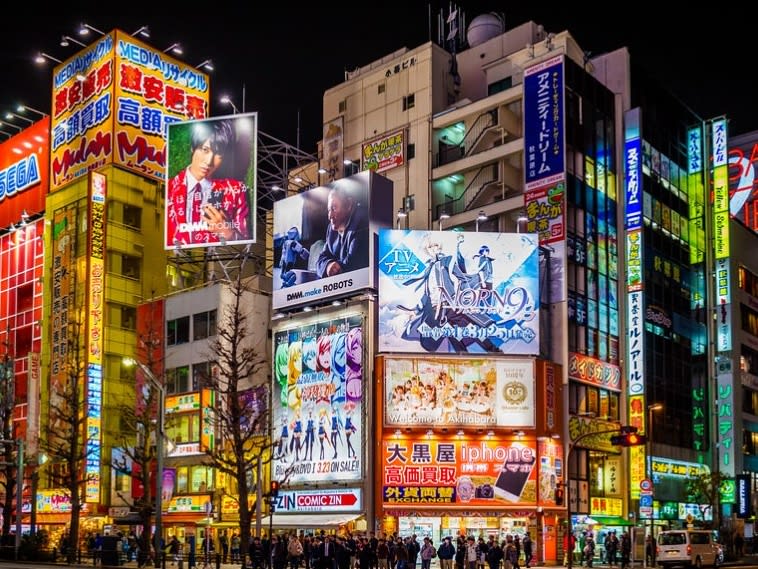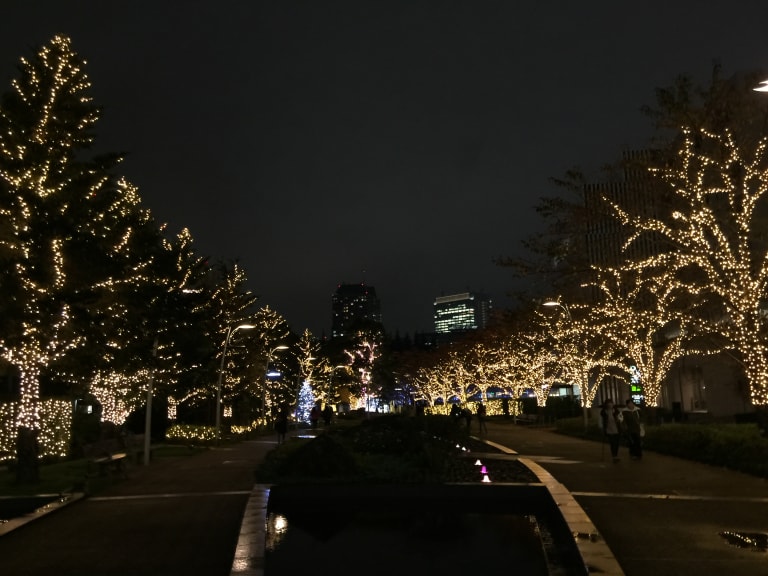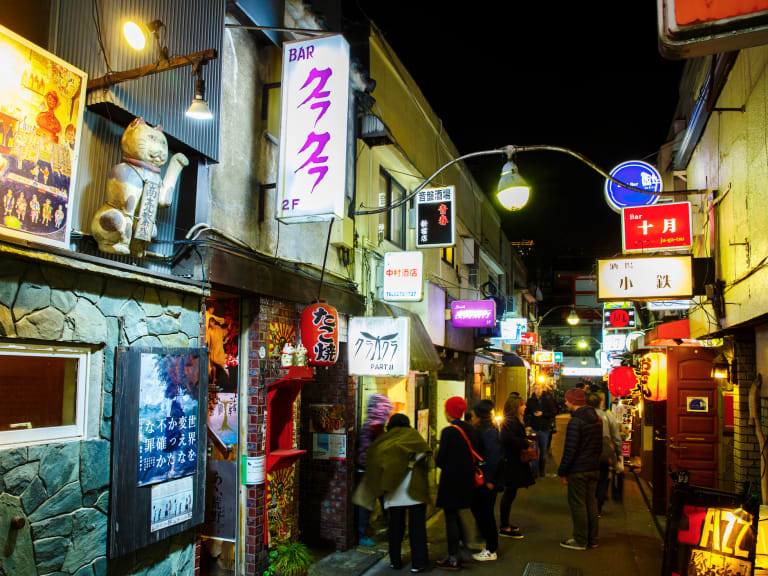10 Things to Do in Tokyo at Night
Tokyo is a cosmopolitan city with a hectic nightlife, illuminated by its unbeatable neon lights and the originality of Japanese culture.

Tokyo by night | ©Takashi Miyazaki
Enjoying the city's nightlife is one of the best things to see and do in Tokyo. At night is when the neon lights come on and the city is shown in all its splendour.
The options are varied: from strolling through an illuminated garden or taking in panoramic views of the city at night to partying in bars and nightclubs, attending anime exhibitions or indulging in fine dining. Akihabara, Ginza, Shibuya, Shinjuku, Roppongi and Asakusa, among others, are more like "cities" with their own identity, offering different experiences for day and night.
1. Visit the Senso-ji temple at night in the Asakusa district

If you want to get to know Tokyo's most historic neighbourhood, it is essential to book a guided tour of the Asakusa neighbourhood, home to the city's oldest Buddhist temple, the Sensoji, which is very charming for its solemnity, as is Nakamise Street, which you come across before entering the temple and after crossing the Kaminarimon gate, its main gate, whose name means "thunder gate".
At night, the shops on Nakamise Street are closed, but there is some wonderful street art on their curtains. Although any time is good, perhaps the best time to visit is during the summer in Tokyo, as during the day these shops sell fans, pottery, kimonos, traditional items and souvenirs. Even so, they tend to be quite crowded, so the evening is ideal for appreciating the beauty and solemnity of the street and temple.
Sensoji Temple is open 24 hours a day and free to enter, although its main halls, such as the Hondo Hall, close at sunset. After visiting the temple, you can wander around Asakusa, Tokyo's 'lower town', known for its tempura restaurants, a traditional Japanese seafood or vegetable frying dish.
2. Sample Tokyo's best sushi and other delicacies on an evening food tour

If you are a lover of Japanese food or if you want to get to know it, sign up for an evening food tour in Tokyo, one of the best things to do in Tokyo. A local guide will lead the small group, never more than 12 people, through various areas of the city to discover specialities such as sushi, grilled meats, cakes and, of course, sake.
Of course, you can also venture out on your own to experience Japanese cuisine. The best place to do this is around the old Tsukiji market, which closed in 2018.
Shops selling fish, food utensils and other seafood products still operate outside the old market, the jogai-shijo. The market is closed at night, but the best sushi restaurants are still located in the vicinity.
Tsukiji Sushi Sei
Tsukiji Sushi Sei is one of the oldest restaurants, which was founded in 1839. There you can sit at a bar and watch the sushi being prepared in front of you. The prices are a bit steep, but the sushi they serve is worth it.
- Location: Chuo City, Tsukiji, 4 Chome-13-5.
- Hours: 11am-3pm and 5-9.30pm.
Choseain
At this restaurant during the evening you can try Japanese dishes or tapas such as sashimi, fish fry and soba noodles. They also offer different sakes to accompany your dinner. It is a simple and small restaurant, but has a lot to offer.
- Location: Chuo City, Tsukiji, 4.
- Opening hours: 11am-2.30pm and 5.30pm-8pm.
3. Spend a beautiful night in the streets and bars of Shibuya

The Shibuya area is one of the most popular with young people. There you can take the opportunity to look out over the city from its observation decks, and appreciate the extraordinary lights and architecture in all its splendour. The area is also full of themed bars and restaurants with delicious sushi. The options are endless, from getting dizzy at Tokyo's most famous zebra crossing, where thousands of people cross in every direction, to reading a book while waiting for your order at a bar.
In Shibuya there are open-air shows, street food stalls and izakaya bars that offer you an open bar at a very low price. One striking thing about the bars is that the food and drink they offer is displayed in the windows. It's a faithful imitation made of plastic, but it's very handy for choosing the menu you like best. In addition, on the facades of the buildings you can see posters with the bars, discos, karaoke bars, restaurants and entertainment venues on the floors and underground levels of the buildings.
Shibuya is also home to the busiest pedestrian crossing in the world, with more than 1 million people crossing it every day. On average, about 3,000 people cross it every 47 seconds, which is why it has become such an attraction for tourists. One of the bars that has a privileged view of the crossing is Starbucks, which is right in front of Shibuya Station.
4. Party at Roppongi's best nightclubs, bars and clubs

Roppongi, a 'city within a city', is home to Tokyo's best nightclubs, making it the choice for partying for visitors and locals alike. Millions of people flock to Roppongi every year, making it one of the most popular areas of the city.
The main clubs in the neighbourhood, and the ones not to be missed, are Maharaja Nightclub and Shot Bar Propaganda. There are also other highly recommended clubs and bars to enjoy the night, such as Odeon and the Hard Rock Café. These are definitely an excellent alternative if you are looking for things to do in Tokyo in winter, as they are not on the street.
Maharaja Nightclub
Maharaja is one of Tokyo's oldest and most renowned nightclubs. Its music, which ranges from classical to modern, is quite varied, as are the drinks and cocktails they serve. On Fridays and Saturdays, it is open until later, around 5am, and tends to attract young people in their 20s and 30s. The rest of the days it is open until midnight, and people in their 40s and older tend to go there.
- Location: 6-1-3 Roppongi, Minatu-ku, Tokyo, 106-0032.
- How to get there: You can get there on foot from Roppongi Station, or the Hibiya and Toel Oedo underground lines. You can also take buses or taxi cars.
Shot Bar Propaganda
Another nightclub you will find open all week is Shot Bar Propaganda, which is open until 5am. Its music covers various genres, such as disco, rock, pop, hip hop, R&B, house and disco music in general. This club is also a popular venue for birthdays, hen and stag parties, weddings and other social events.
- Location: 3-14-9 Roppongi, Minatu-ku, Tokyo, 106-0032.
- How to get there: You can walk there in 3 minutes from Roppongi Station.
5. Take a nighttime stroll through Akihabara, the centre of anime

The night is ideal for a stroll through the extraordinary shopping district of Akihabara, where its streets transport you to the electronic and robotic world of Tokyo. You can find the most sophisticated shops with unbeatable prices in the world, and unique manga and anime productions, such as films, comics and video games. Akihabara is known as **Tokyo'**s electronic city or anime city for a reason.
Must-see shops include the Tokyo Anime Center (open until 8pm), where you can find comics, movies, robotic exhibits, anime posters, video games and all kinds of electronic products and accessories; and the Akihabara Radio Kaikan, a huge building where you can find video games and toys with unique designs (open until 10pm).
Akihabara is also known for its unusual themed bars that go by the name of maid cafe. In these strange bars the waitresses are dressed as maids, treat you as if you were their master, sing to you and also decorate your food in a very cute way.
6. Discover the charm of Ginza's architecture at night

Ginza is Tokyo's most luxurious neighbourhood and has been compared to New York's Fifth Avenue. You will be fascinated by the architecture of its buildings, some of the most modern and original in the world. For this reason, the illuminated streets of Ginza are the most popular for photo tours of Tokyo both during the day and at night.
One of the most striking buildings in Ginza is the Tokyu Plaza Ginza, designed by Nikken Sekkei, with its spectacular glass front, which is illuminated in a very special way at night.
Opposite the Tokyu Plaza Ginza is the Fujiya Building, also spectacular. Other iconic buildings in the neighbourhood belong to more recognisable brands such as Hermés, Sony, Coah de Ginza, GAP, Armani Ginza Tower, Louis Vuitton, Gucci, Dior, Channel, Zara and Bulgari, among others.
7. Sing in a bar using the original Japanese karaoke bars

For many years, Japan has been identified in the West with karaoke. Going to one during your trip is almost as obligatory as hiking Mount Fuji from Tokyo. Karaoke is something that Japanese people and tourists love to do. After work, Japanese people often relax in karaoke bars, so they are a good place to meet the locals.
In karaoke bars, Japanese people often rent private boxes, with drinks and food included, to enjoy alone with friends, family or guests. It is different from other places where karaoke is done publicly and in the same place.
Karaoke is a Japanese invention from the 1970s. The word karaoke means "empty orchestra". The musician Daisuke Inoue invented it to satisfy the requests of a client who wanted musicians to play at an event with his company's shareholders whom he wanted to surprise.
8. Tour Ueno Park by night

In Tokyo's Taitō-ku district, Ueno Park is a public park with several major museums, a giant water lily pond, Toshogu Shrine, Benten-do, Kaneiji and Kiyomizu Kannon temples, and a concert hall. You can't miss this visit on your list of things to do in Tokyo in February or March, as this is when the cherry blossoms are in bloom.
In fact, this park is home to Japan's famous Cherry Blossom Avenue, which attracts visitors from all over the world. There are about 800 cherry trees which, when in bloom, create a marvellous environment. Thousands of lanterns are set up during the sakura matsuri, the cherry blossom festival, so that the blossoms can be seen at night.
Ueno Park is a symbol among Japan's urban parks. It is about 140 years old and is still being modernised every day. You can access it for free every day until 11pm. You will love its huge garden, with ginkgo, camphor, zelkova, cherry and lotus plants.
9. Have a drink in an izakaya bar

The izakaya bars are the typical Japanese bars where locals go for a drink and a bite to eat after work. They are not fancy places, but they offer very good menus at a good price. In some izakaya you can eat as much as you want for a certain amount of time for a fixed fee, with drinks on the side.
These bars are located around train stations, in alleyways called yokochos, where they are more accessible to employees on their way home from work.
The best known are in Omoide Yokocho and Ginza, in narrow alleyways. They are also often a place to meet before going to pubs or clubs.
10. Get to know one of Tokyo's top spots: Shinjuku, the city that never sleeps

No matter what time you arrive in Shinjuku, you'll be entertained 24 hours a day, all week and all night long. Near its Shinjuku train station, in the Kabukichō area, you'll find restaurants, cinemas, bars and shopping centres, as well as electronics shops.
There are many skyscrapers in Shinjuku, including the city's tallest, the 243-metre-high Metropolitan Government Building. This building has a free observation deck which is open until about 9pm and inside you can dine and buy beautiful souvenirs.
Within Shinjuku there are 'neighbourhoods' with their own identity, such as Kabukichō, where there are more bars, restaurants and karaokes; Shinjuku ni-chome, a gay neighbourhood; Waseda, a university neighbourhood; and Shinjuku Gyoen National Garden, where there is a beautiful park.
Golden Gai in Kabukichō
The Golden Gai "neighbourhood" in the Kabukichō district is characterised by narrow alleyways, interesting bars and restaurants for dining, small shops and an unmissable decoration with lamps and neon lights. You can also see the 12-metre high Godzilla head on the rooftop of the Gracery themed hotel. You can enter the hotel for free and watch a show that features Godzilla shooting a beam of smoke and growling every hour.
- Location: 1-19-1 Kabukicho, Shinjuku-ku - Tokyo, Japan
Hotel Park Hyatt Tokyo
The bar at the Park Hyatt Hotel Tokyo has become a cult after the film Lost in Translation featured the hotel's facilities. Drinking at the bar can be a bit pricey, but that doesn't matter to fans of the film that has become a cinema classic.
- Location: 3-7-1-2 Nishi-Shinjuku, Shinjuku-Ku, Tokyo, Japan, 163-1055
